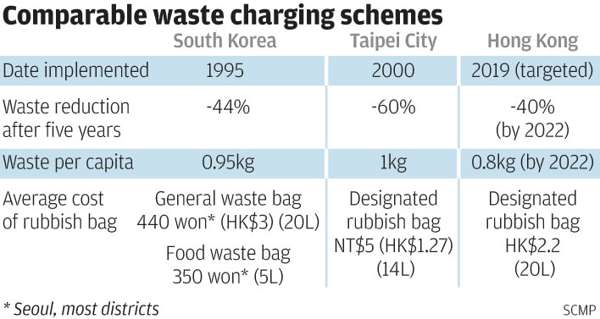
Hong Kong restaurants will just pass on waste charges to diners, businessman warns
Extra expense could also drive out smaller operators, he says
Restaurateurs doubt that a waste charging scheme will reduce rubbish at source and warn it may result in bigger bills for diners while forcing small operators out of business.
Simon Wong Kit-lung, owner and manager of two companies with more than 30 restaurants, said a 10,000 sq ft Chinese yum cha restaurant produced roughly four cartloads of waste a day, a weight of between one and 1.5 tonnes.

“The easiest way to [offload] the additional cost is to slap an extra HK$1 or HK$2 on each dish. But this is something I do not wish to do,” he said.
Wong said plenty of alternative ideas were floated by the catering industry during the consultation period.
“We felt that instead of charging users across the board, the government should award those who voluntarily cut down on waste volume,” he said.
One proposal was to set a chargeable ceiling based on the scale of the premises.
A lot of times it was leftover food by customers, and this is something we cannot control
“We can work out a reasonable weight or volume judging by the restaurant’s size. If you go over that, then you start paying the levy – in this case there would be motivation to minimise waste,” he explained.
Wong said his restaurants already sorted out recyclable items such as aluminium cans and cardboard.
He believed there was not much room to reduce waste further.
“A lot of times it was leftover food by customers, and this is something we cannot control.”
Simon Wong Ka-wo, president of the Hong Kong Federation of Restaurants and Related Trades, agreed.
“In Hong Kong, restaurants host banquets totalling 8,000 tables of 12 every day. But a quarter of the food on those tables ends up in rubbish bins,” he said, adding that cooked food would not be recycled for safety reasons.
He estimated that the charges would cost most small to medium-sized restaurants an extra HK$500 a month.
“This may not seem a lot, but bear in mind that 30 per cent of restaurants in Hong Kong are losing money, while 40 per cent only break even,” he said.
“Any extra expenditure means a lot to the smaller players, which make up 98 per cent of the market.”
Simon Wong Kit-lung said one way to cut down on restaurant waste was to demand suppliers strip down the packaging of raw ingredients.
There were also creative solutions.
“Can we opt for chicken and fish fillets like many Western restaurants do, instead of using whole chicken or fish? This is something worth exploring in the future, but right now most customers still prefer dishes prepared from meat that is freshly slaughtered.”

